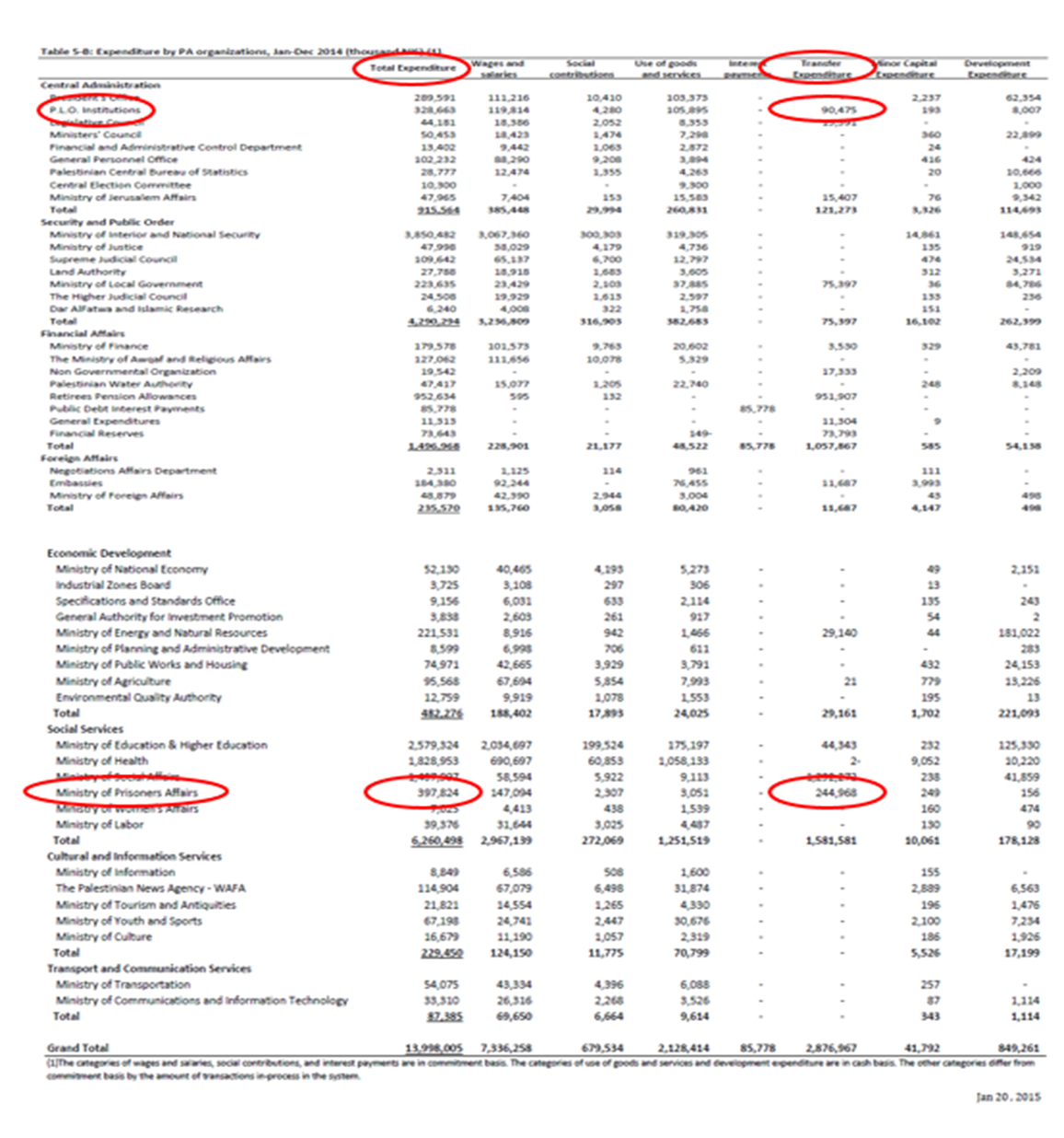The PA is trying to hide its payments to terrorists
- Ever since PMW first notified the donor countries of that the PA was using their money to pay salaries to terrorist prisoners, the PA has been doing everything it can to confuse and distract its donors. In 2014, the PA closed the PA Ministry of Prisoners’ Affairs, and in 2015 it created the PLO Commission of Prisoners’ Affairs. In 2018, it reopened the PA Ministry of Prisoners’ Affairs and in 2019 it changed its name to the Commission for Detainees’ Affairs. Now in 2020, it is trying to hide its payments by moving them once again from the PA to the PLO.
- The PA’s monthly “budget performance reports” which are supposed to be a transparent reflection of its real expenses for the benefit of donor countries, do not list even one shekel of payment to terrorist prisoners in its 2020 expenditures. Yet the PA Prime Minister openly announced in March that the PA is paying prisoners’ salaries, and is even giving them priority. Clearly the PA’s published “transparent” reports are just a charade to distract donors.
The Palestinian Authority’s monthly financial documents for 2020 show that the PA is, again, trying to hide its monthly salary payments to the Palestinian terrorist prisoners from the international community. Its monthly budget performance reports for 2018 and 2019 openly listed the salaries to terrorist prisoners as expenditures of the PA Ministry of Prisoners’ Affairs. However, since the beginning of 2020, there is no listing at all for the Ministry of Prisoners’ Affairs.
Palestinian Media Watch has examined the PA’s financial reports, as well as statements of PA officials, and can confirm that even though the PA has removed the listing of the Ministry of Prisoners’ Affairs the PA is still paying the monthly salaries to terrorist prisoners, but is trying to hide them by listing them under a different category.
Every month the PA transfers millions of shekels to “PLO institutions.” PMW’s analysis of the PA “budget performance reports” shows that while the expenditure on the Ministry of Prisoners’ Affairs has been removed, there has been a huge rise in the amount the PA transfers to the “PLO institutions” – an amount equivalent to what the PA used to allocate to the Ministry of Prisoners’ Affairs. In other words, the PA is continuing to fund the salaries to terrorists but is listing it, not as a direct PA expense, but hiding it under the PLO expenditures.
The reason for this is very clear. As a recipient of international funding, the PA is obligated by donor countries to show full transparency and publicly list all its expenses, whereas the PLO is not accountable to anyone for how it spends its money. The PA wants to prevent the international community from seeing listings like the one below in its “budget performance report” of 2019 showing 517 million shekels to pay salaries to terrorists in prison listed under the “Commission of Detainee Affairs”. (Note: the 517 million shekels in the right circle are the salaries to terrorists, while the 619 million shekels in the middle circle is the full budget of the Commission.)

Examining the Jan. – March 2020 listing below, we find the PA is now hiding its salaries to terrorists within the 148 million (right circle) in the category of “PLO institutions”-
![]()
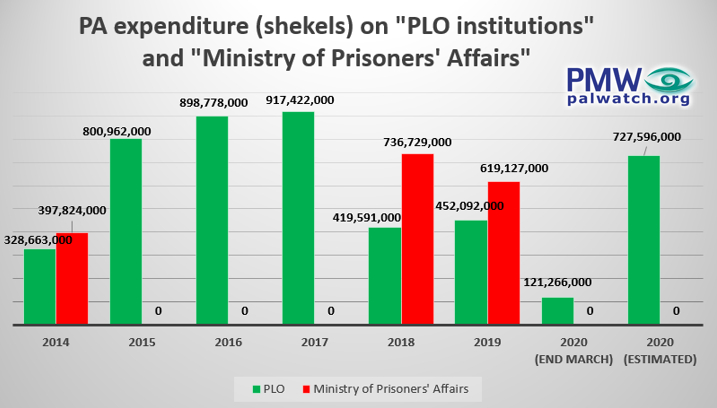
This is not the first time the PA has tried to hide its expenditures on the salaries to the terrorist prisoners. In 2014, after a series of PMW events in European parliaments and meeting with members of the US Congress resulted in threats from the donors to cut all funding to the PA due to the PA’s terror rewards, the PA stopped paying salaries to terrorists directly. It closed its Ministry of Prisoners’ Affairs and transferred the terrorist payments to a new PLO Commission of Prisoners' Affairs. At the time, PMW’s report The PA's billion dollar fraud exposed the PA’s effort to deceive the world with a cosmetic change concealing its terror payments, which brought condemnation and outrage from the donor countries.
As the above graph demonstrates, in 2014, when the PA was openly listing its payments to the terrorist prisoners, its expenditure on the “PLO institutions” was only 328.6 million shekels. However, when the PA tried to hide the payments in 2015, 2016, and 2017, the PA expenditure on the “PLO institutions” suddenly spiked to 800 - 900 million shekels. In 2018, the PA reverted to openly listing its expenditure under the “Ministry of Prisoners’ Affairs”, and its expenditure on the “PLO institutions” plummeted. Now the PA is again trying to hide its salaries to the terrorist prisoners by having no listing at all for the “Ministry of Prisoners Affairs” but its expenditure on the “PLO Institutions” has risen again.
Further proof that the PA is still funding the terrorist prisoners is clear from another category in the PA “budget performance reports.” Each listing includes the full budget as well as a subcategory called “transfer expenditures.” The “transfer expenditures” are the part of the budget that are payments to a third party and it is here that the salaries to terrorists are included.
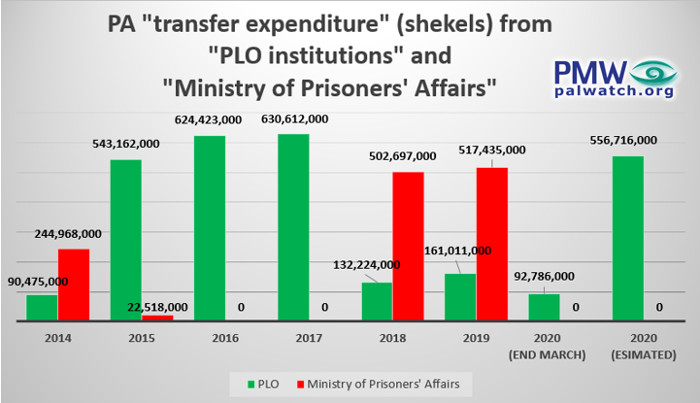
In 2014, when the PA was openly paying prisoners, the Ministry of Prisoners’ Affairs’ “transfer expenditures,” was 245 million shekels, while the PLO “transfer expenditures” was only 90 million shekels. However, in 2015 when the PA closed the Ministry of Prisoners’ Affairs, the PLO “transfer expenditures” rose to 543 million shekels, reflecting the PLO payments to the terrorist prisoners with money it received from the PA.
In 2016 and 2017 the PLO “transfer expenditures” remained high, at 624 and 630 million shekels respectively, reflecting the continued salary payments to terrorists by the PA via the PLO.
However, in 2018 and 2019, when the PA reverted to openly listing its payments to the terrorist prisoners under the PA Ministry of Prisoners’ Affairs’, the “transfer expenditures” of the “PLO institutions” returned to its lower level.
In 2020, with the PA again paying the terrorists through the PLO, the annual “transfer expenditures” of the “PLO institutions” based on the first quarter of 2020 will rise from 161 million shekels in 2019 to 595 million shekels in 2020 - a rise of 270%!
Ever since PMW first notified the donor countries of the PA’s use of their money to pay salaries to terrorist prisoners, the PA has been doing everything it can to confuse and distract its donors. In 2014, the PA closed the PA Ministry of Prisoners’ Affairs, and in 2015 it created the PLO Commission of Prisoners’ Affairs. In 2018, it reopened the PA Ministry of Prisoners’ Affairs and in 2019 it changed its name to the Commission for Detainees’ Affairs. Now in 2020, it is trying to hide its payments by moving them once again from the PA to the PLO.
Clearly, PMW’s ongoing updates on the PA terror rewarding policies remain a source of great international pressure on the PA.
In addition to the money trail from the PA to the PLO to the terrorists documented above, clear statements made by PA leaders confirm that the PA’s payments to terrorists continue unabated.
In response to the Coronavirus pandemic, PA Prime Minster Muhammad Shtayyeh announced that to avoid the gathering of crowds, the payment of the March 2020 salaries would be staggered - with prisoners receiving on the third day - as follows:
“On the first day, the salaries of the medical and supporting personnel will be paid.
On the second day, to the [PA] Security Forces members.
On the third day, to the prisoners and [the families of] the Martyrs.
On the fourth day, to welfare cases and the poor.
On the fifth day, to the teachers.
On the sixth day, to the rest of the [PA] public employees.
The last payment, on the seventh day, will be to senior officials, to high level state employees, and to the ministers.”
[WAFA, Official PA news agency, March 29, 2020]
Donor countries should be alarmed by this statement and the deception that it exposes.
The PA’s monthly “budget performance reports” which are supposed to be a transparent reflection of its real expenses for the benefit of donor countries, does not list even one shekel of payment to terrorist prisoners in its 2020 expenditures. Yet the PA Prime Minister openly announced that the PA is paying prisoners’ salaries, and is even giving them priority. Clearly, the PA’s published “transparent” reports are just a charade to distract donors.
The Prime Minister’s statement, and other statements by PA officials after PMW warned the Palestinian banks of Israeli legislation that is about to come into force that criminalizes the payment of the salaries, prove that despite the deceptive listing, the PA has not stopped rewarding terrorists with salaries.
The PA’s renewed attempt to hide its terror reward payments is most probably the result of growing international pressure. There are now four countries (USA, Canada, Australia and Holland) that withhold aid to the PA as a direct result of PMW’s exposure of its terror reward payments. 2018 Israeli legislation also imposes punitive sanctions on the PA for its continued payments to terrorists. Other Israeli anti-terror legislation is now being used, upon PMW’s recommendation, to seize the terror salaries that have been paid by the PA to Israeli Arab terrorists.
As PMW did the previous times we exposed the PA attempts to deceive the international community, PMW will be supplying the documentation of the PA’s new attempt to conceal its terror reward payments to the donor countries. PMW is confident that just like the donor countries responded with outrage and funding cuts to the PA’s attempt at deception in the past, they will respond similarly to the PA’s latest attempt to hide its rewarding of terror.
The following are copies of the official PA budget performance reports, as published in English. Note that in the middle of 2019, the PA changed the name of the “Ministry of Prisoners’ Affairs” to the “Commission for Detainees Affairs.”
Budget performance report 2020 (first quarter):
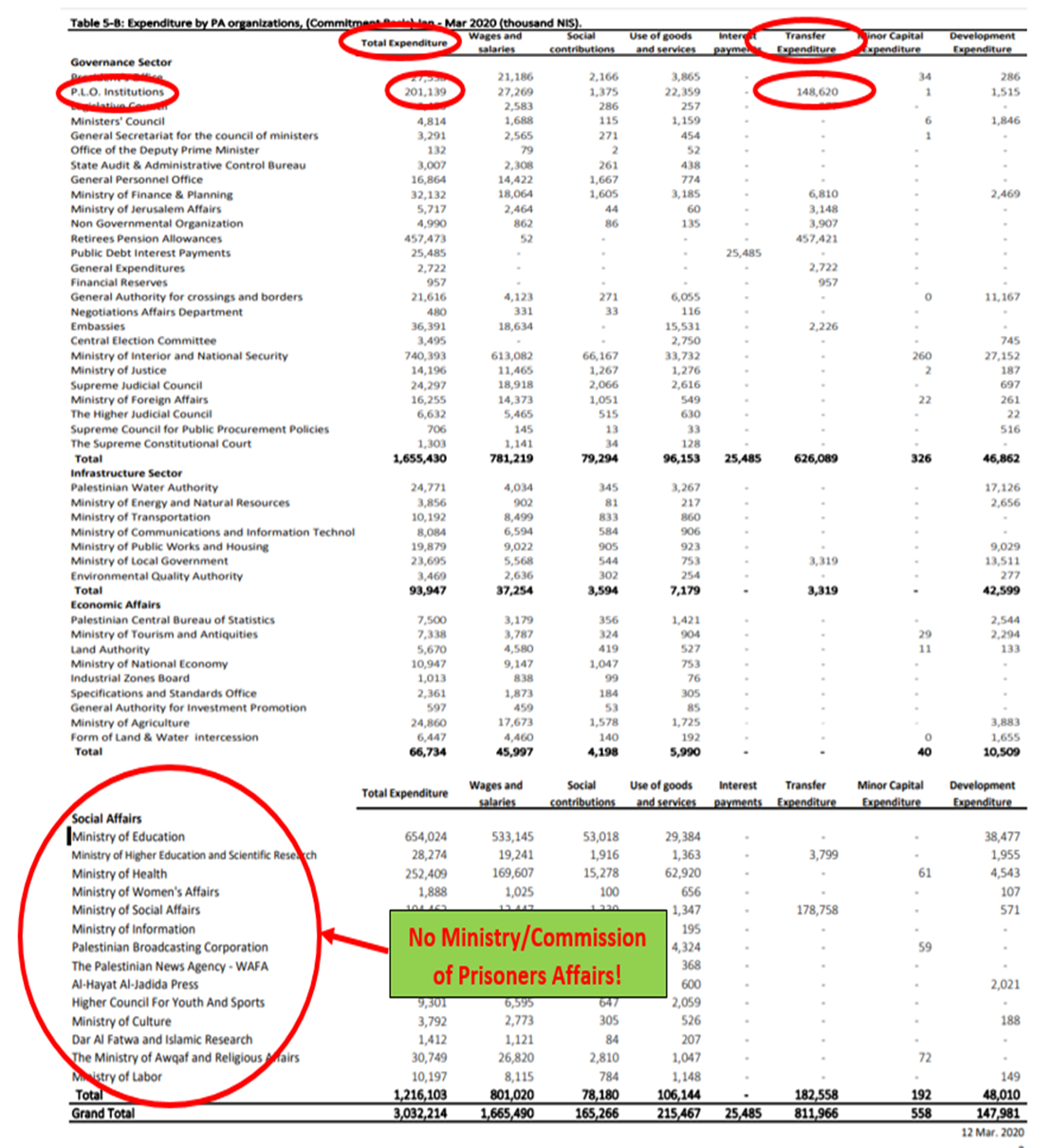
Budget performance report 2019: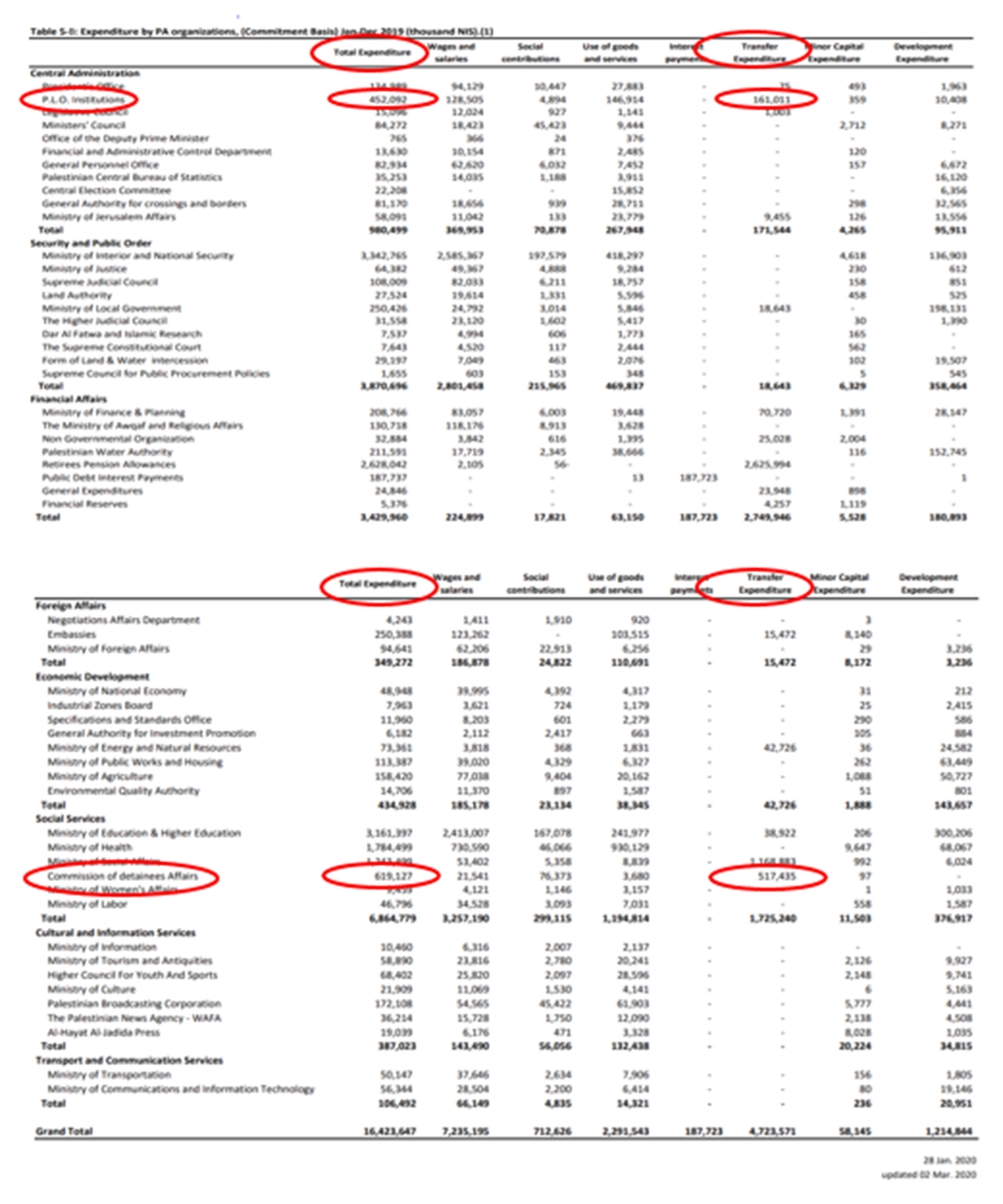
Budget performance report 2018:
Budget performance report 2016:
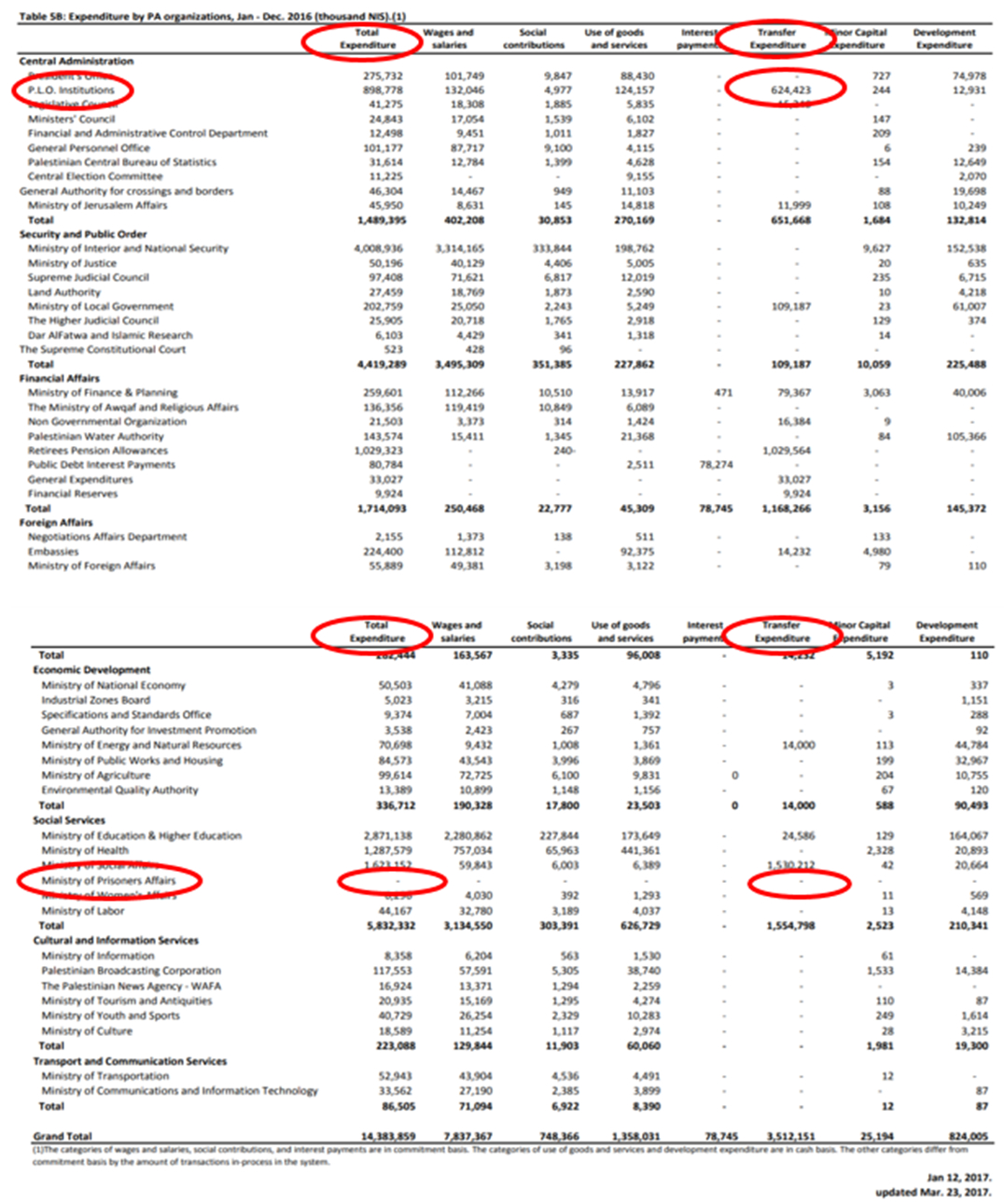
Note: The PA did not publish a December budget performance report in English in 2015
Budget performance report 2014: